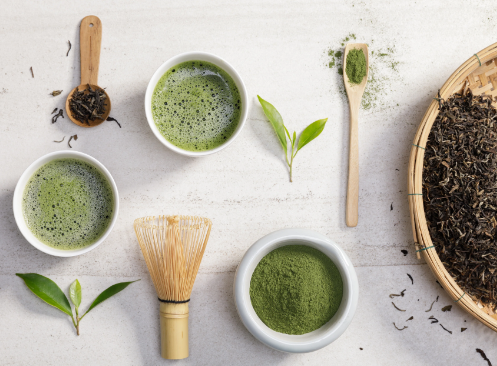Content Menu
● Understanding Green Tea Extract
● Recommended Dosages
● Risks of Excessive Consumption
● Case Studies and Reports
● Mechanisms of Hepatotoxicity
● Safe Consumption Practices
● Benefits vs. Risks
>> Potential Health Benefits
>> Weighing the Risks
● Conclusion
● FAQ
>> 1. What are the symptoms of liver damage from green tea extract?
>> 2. Is drinking brewed green tea safer than taking extracts?
>> 3. How much green tea extract should I take daily?
>> 4. Can anyone take green tea extract?
>> 5. Are there any long-term studies on the safety of green tea extracts?
● Citations:
Green tea extract has gained popularity for its potential health benefits, including weight loss, improved brain function, and antioxidant properties. However, excessive consumption can lead to serious health risks, particularly liver damage. This article explores the dangers associated with green tea extract, safe consumption levels, and the potential side effects of overindulgence.

Understanding Green Tea Extract
Green tea extract is derived from the leaves of Camellia sinensis, the same plant used to produce green tea. It is rich in catechins, particularly epigallocatechin gallate (EGCG), which is believed to be responsible for many of its health benefits. Unlike brewed green tea, which contains a moderate amount of catechins, green tea extract can contain concentrated doses that may pose health risks when consumed in large quantities.
Recommended Dosages
The recommended daily intake for green tea extract varies based on its concentration:
- General Recommendation: For most adults, a daily intake of 250-500 mg of EGCG is considered safe when taken with food.
- Maximum Safe Limit: Health Canada recommends a maximum daily intake of 800 mg of EGCG from supplements to minimize the risk of liver injury.
Risks of Excessive Consumption
While moderate consumption of green tea and its extracts can be beneficial, excessive intake can lead to severe side effects:
- Liver Damage: High doses of EGCG have been linked to liver toxicity. Reports indicate that some individuals have experienced acute liver failure after consuming concentrated green tea extracts. Symptoms may include jaundice (yellowing of skin and eyes), abdominal pain, dark urine, and fatigue.
- Gastrointestinal Issues: Overconsumption can lead to nausea, vomiting, diarrhea, and abdominal discomfort. These symptoms are often exacerbated when the extract is taken on an empty stomach.
- Caffeine Sensitivity: Green tea extract contains caffeine, which can cause insomnia, anxiety, irritability, and heart palpitations in sensitive individuals or when consumed in large amounts.
Case Studies and Reports
Several case studies highlight the dangers associated with high doses of green tea extract:
1. Acute Liver Injury: A review identified over 200 cases of liver injury linked to green tea products. Some patients required liver transplants due to severe damage caused by high doses of EGCG.
2. Weight Loss Supplements: Products like Hydroxycut and Exolise have been implicated in liver injuries leading to market withdrawals after reports of adverse effects surfaced.
3. Genetic Factors: Research suggests that certain genetic variations may predispose individuals to liver damage from green tea extracts. This highlights the importance of personalized approaches to supplementation[1].
Mechanisms of Hepatotoxicity
The mechanisms behind green tea extract-induced liver damage are complex and not fully understood. However, several potential pathways have been identified:
- Oxidative Stress: The high concentrations of catechins in green tea extracts can lead to oxidative stress in liver cells. This stress can damage cellular structures and lead to inflammation.
- Mitochondrial Dysfunction: EGCG has been shown to affect mitochondrial function, leading to impaired energy production and increased susceptibility to cell death[2].
- Idiosyncratic Reactions: Some individuals may experience unique reactions to green tea extracts due to genetic predispositions or other factors that are not yet fully understood[3].

Safe Consumption Practices
To safely enjoy the benefits of green tea extract while minimizing risks:
- Consult a Healthcare Provider: Before starting any supplement regimen, especially if you have pre-existing health conditions or are taking medications.
- Follow Recommended Dosages: Stick to the recommended daily intake and avoid exceeding 800 mg of EGCG from supplements.
- Take with Food: Consuming green tea extract with meals can help reduce gastrointestinal discomfort and lower the risk of liver toxicity.
Benefits vs. Risks
While there are significant risks associated with high doses of green tea extract, it is essential to recognize its potential benefits when consumed responsibly:
Potential Health Benefits
- Weight Management: Studies suggest that green tea extract may aid in weight loss by enhancing metabolic rates and fat oxidation[4].
- Antioxidant Properties: The catechins found in green tea are powerful antioxidants that may help protect against oxidative stress-related diseases like cancer and cardiovascular disease[5].
- Cognitive Function: Some research indicates that EGCG may improve cognitive function and protect against neurodegenerative diseases[6].
Weighing the Risks
When considering supplementation with green tea extract, it is crucial to weigh these benefits against the potential risks:
- Individuals with pre-existing liver conditions or those taking medications that affect liver function should exercise caution.
- Pregnant or breastfeeding women should also consult healthcare professionals before using supplements containing concentrated forms of green tea[7].
Conclusion
While green tea extract offers numerous health benefits, it is crucial to be aware of its potential dangers when consumed in excess. Following recommended dosages and consulting healthcare professionals can help mitigate risks associated with liver damage and other side effects. As research continues to evolve, understanding individual susceptibility will be key in safely incorporating this popular supplement into one's diet.

FAQ
1. What are the symptoms of liver damage from green tea extract?
Symptoms may include jaundice (yellowing skin/eyes), dark urine, abdominal pain, nausea, vomiting, unusual tiredness, and loss of appetite.
2. Is drinking brewed green tea safer than taking extracts?
Yes, traditionally brewed green tea is generally considered safer than concentrated extracts due to lower catechin levels.
3. How much green tea extract should I take daily?
The recommended daily intake is between 250-500 mg of EGCG for most adults; exceeding 800 mg may increase the risk of liver injury.
4. Can anyone take green tea extract?
Not everyone should take it; individuals with liver issues or those on certain medications should consult a healthcare professional before use.
5. Are there any long-term studies on the safety of green tea extracts?
Long-term studies are limited; however, existing research indicates potential risks associated with high doses over extended periods.
Citations:
[1] https://www.rutgers.edu/news/green-tea-extract-may-harm-liver-people-certain-genetic-variations
[2] https://journals.lww.com/ajg/fulltext/2020/10001/s2597_case_report__a_case_of_drug_induced_liver.2597.aspx
[3] https://www.webmd.com/vitamins/ai/ingredientmono-960/green-tea
[4] https://www.canada.ca/en/health-canada/services/food-nutrition/public-involvement-partnerships/notice-modification-list-permitted-supplemental-ingredients-permit-use-green-tea-extract-supplemental-ingredient-foods/document.html
[5] https://pmc.ncbi.nlm.nih.gov/articles/PMC7009618/
[6] https://www.ncbi.nlm.nih.gov/books/NBK547925/
[7] https://www.healthline.com/nutrition/camellia-sinensis-leaf-extract
[8] https://www.drugs.com/npp/green-tea.html
[9] https://www.urmc.rochester.edu/encyclopedia/content?contenttypeid=19&contentid=greenteaextract
[10] https://www.wjgnet.com/1007-9327/full/v19/i31/5174.htm
[11] https://www.medicalnewstoday.com/articles/269538

 English
English 




























